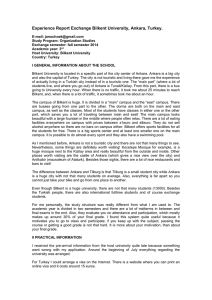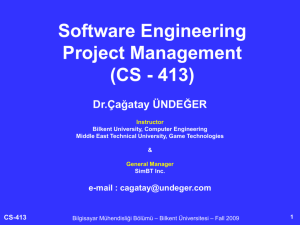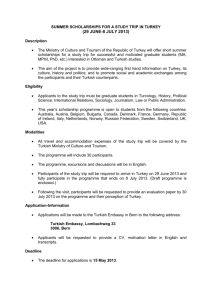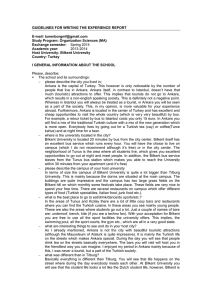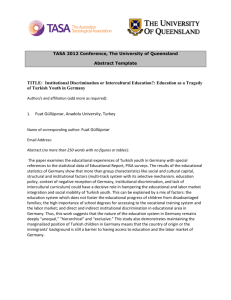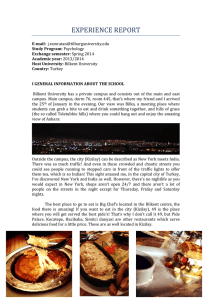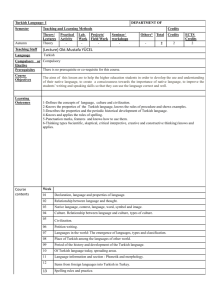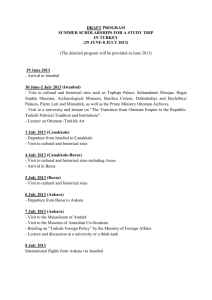Experience Report Bilkent University, Ankara, Turkey
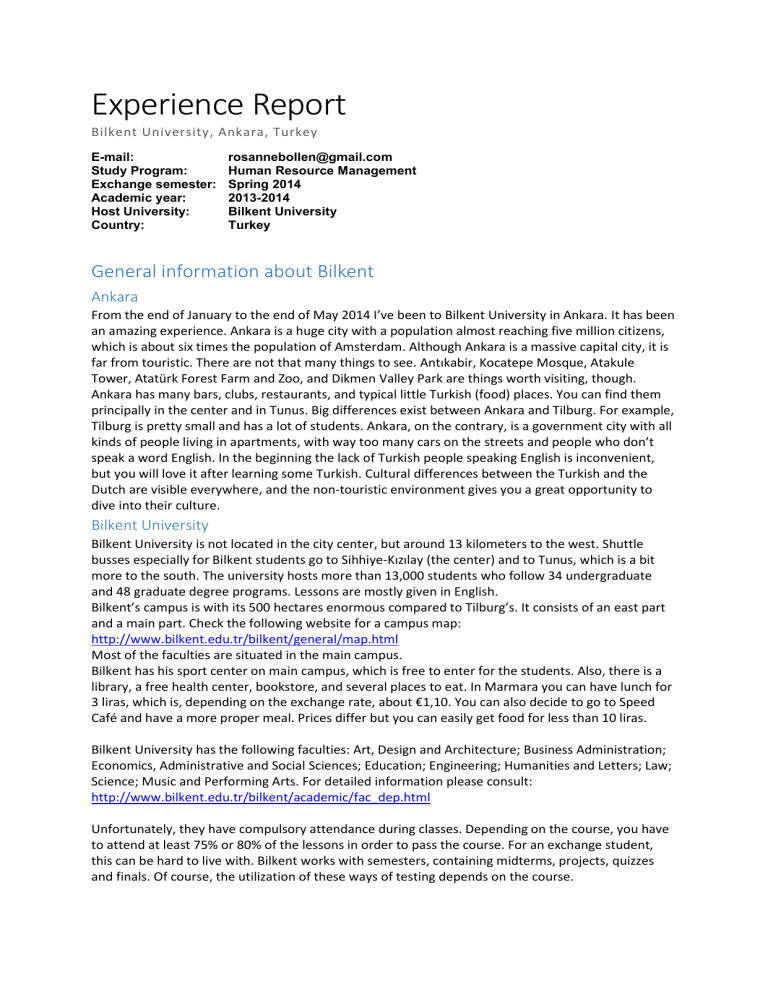
Experience Report
Bilkent University, Ankara, Turkey
E-mail:
Study Program:
Country: rosannebollen@gmail.com
Human Resource Management
Exchange semester: Spring 2014
Academic year: 2013-2014
Host University: Bilkent University
Turkey
General information about Bilkent
Ankara
From the end of January to the end of May 2014 I’ve been to Bilkent University in Ankara. It has been an amazing experience. Ankara is a huge city with a population almost reaching five million citizens, which is about six times the population of Amsterdam. Although Ankara is a massive capital city, it is far from touristic. There are not that many things to see. Antıkabir, Kocatepe Mosque, Atakule
Tower, Atatürk Forest Farm and Zoo, and Dikmen Valley Park are things worth visiting, though.
Ankara has many bars, clubs, restaurants, and typical little Turkish (food) places. You can find them principally in the center and in Tunus. Big differences exist between Ankara and Tilburg. For example,
Tilburg is pretty small and has a lot of students. Ankara, on the contrary, is a government city with all kinds of people living in apartments, with way too many cars on the streets and people who don’t speak a word English. In the beginning the lack of Turkish people speaking English is inconvenient, but you will love it after learning some Turkish. Cultural differences between the Turkish and the
Dutch are visible everywhere, and the non-touristic environment gives you a great opportunity to dive into their culture.
Bilkent University
Bilkent University is not located in the city center, but around 13 kilometers to the west. Shuttle busses especially for Bilkent students go to Sihhiye-Kızılay (the center) and to Tunus, which is a bit more to the south. The university hosts more than 13,000 students who follow 34 undergraduate and 48 graduate degree programs. Lessons are mostly given in English.
Bilkent’s campus is with its 500 hectares enormous compared to Tilburg’s. It consists of an east part and a main part. Check the following website for a campus map: http://www.bilkent.edu.tr/bilkent/general/map.html
Most of the faculties are situated in the main campus.
Bilkent has his sport center on main campus, which is free to enter for the students. Also, there is a library, a free health center, bookstore, and several places to eat. In Marmara you can have lunch for
3 liras, which is, depending on the exchange rate, about €1,10. You can also decide to go to Speed
Café and have a more proper meal. Prices differ but you can easily get food for less than 10 liras.
Bilkent University has the following faculties: Art, Design and Architecture; Business Administration;
Economics, Administrative and Social Sciences; Education; Engineering; Humanities and Letters; Law;
Science; Music and Performing Arts. For detailed information please consult: http://www.bilkent.edu.tr/bilkent/academic/fac_dep.html
Unfortunately, they have compulsory attendance during classes. Depending on the course, you have to attend at least 75% or 80% of the lessons in order to pass the course. For an exchange student, this can be hard to live with. Bilkent works with semesters, containing midterms, projects, quizzes and finals. Of course, the utilization of these ways of testing depends on the course.
Practical information
Available information
I received the pre-arrival forms pretty short before departure. Sometimes it took some time before my exchange coordinator for Bilkent sent a reply via mail, but everything went well.
Visa
When going to Turkey for exchange, you need to apply for a visa, for which you have to go to the
Turkish consulate, for example in Rotterdam. For me it took between one and two weeks before I could pick up my visa. Luckily, I did not have any problems. If I remember it correctly, the visa costs
€70. With this visa only you can’t yet leave and re-enter Turkey. Therefore you need a residence permit, which will be arranged via the international office. We waited about one month before we got our residence permit, because the international office did not immediately go to the police to apply for these ID cards. If you plan to leave Turkey for a few days within the first month, make sure the international office arranges the residence permits as soon as possible.
Arrival
I arrived on one of the two arrival dates as arranged by Bilkent University. On the airport I had to wait some time before I was picked up by two ESN (Erasmus Student Network) members. It was really convenient for me to have people picking me up from the airport and driving me to the university, as I had no idea how the transport worked and obviously (almost) nobody speaks English.
When we arrived at the university we went to the international office so we could complete some administrational work, like copying passports. This was all well-organized.
Orientation/Introduction activities
The week after the arrival days, the ESN group had organized a nice introduction week, during which we got to know the Erasmus students. The ESN members don’t work with a buddy system, but they are extremely helpful when you ask them for help. The introduction period included several activities, for example, we went to the mausoleum of Atatürk Anıtkabir, had lunch with teachers, attended some presentations, and we had between 12 and 15 hours of Turkish class. Although most of the presentations were quite boring, the Turkish lessons were fantastic, since the teacher was incredibly funny and interactive. She taught us a lot about the Turkish culture, and the basics and most relevant fun facts of the language. I found these lessons absolutely useful and fun.
Housing
It is possible to live on campus, which is free for exchange students, when booking a double room. A single room costs extra. There are quite a lot of dorm buildings, which are separate for boys and girls.
You can apply for these in advance. I only applied for a room for the first week, as I do not like the idea of being locked up, because there is a lot of security and cleaning staff who ‘control’ the students, the university is far away from the city and buses only drive once an hour and no later than midnight. If you prefer an easy, secure and cheap stay and you are not bothered by living out of the city, it may be a good option to live on campus.
I had no other accommodation arranged for the remaining stay, but with the help of ESN members, it was easy to find an apartment for four Erasmus students in the city. The university does not provide any help searching for an alternative housing, as they want you to stay on campus. For our apartment, which was perfectly located in the city, near cafes, the big shopping street Tunali, and three minutes away from the bus stop, we paid 1600 liras rent each month, so 400 liras each, which was around 130-140 euros (depending on the exchange rate). For water, gas and electricity we paid around €60 each month for the apartment. The apartment was great, it had one big and two small bedrooms, a bathroom, a separate toilet, a hallway, a kitchen and a big living/dining room. It was perfect to held parties, and having people sleeping over on the couch.
Living Costs
Fortunately you can apply for the Erasmus grant, which was €220 per month, so €880 in total.
Furthermore, I received about €100 compensation for public transport, and the usual student loan.
Finally, I had my own savings. I do not have a clear picture of my expenses in Turkey. The food is cheap, the apartment cost less than my own room back in Tilburg, and travelling is cheaper than it is in Holland. For example, you can go from Ankara to Alanya by bus, which takes about eight or nine hours and you only pay 100 liras, which is around €34. Obviously, you spend a lot more money than usual. Except for a few weekends, I have travelled every weekend, mostly with groups of five or six people. Travelling is certainly the thing I spent most my money on, which was definitely worth it.
During my exchange I have been to Istanbul, Konya, Capadoccia, Safranbolu, Eskisehir, Trabzon, Rize,
Cyprus, Alanya, Antalya, and Fethiye. After my finals I also went to Marmaris, Datça, Didim, Izmir. As you can tell, Turkey is a great country for travelling.
On http://www.obilet.com/ you can find all bus companies including the bus schedules and prices.
Note that your credit card may not work, in that case you can easily go to one of the bus company’s ticket office and buy tickets there.
Academic Calendar
The arrival dates were on the 25 th
and 26 th
February the 5
of January, followed up by the introduction week. On th
classes started and on the 16 th
of May the semester ended. Compared to Tilburg, this was quit a short semester. There was nog mid-term break, though. Officially, the finals took place between 21 and 29 May, but luckily Erasmus students are allowed to take the finals earlier, which meant that my final period was between the 15 th
and 22 nd
of May.
The International Office
The international office is located on campus near the dorms and the sports center. Here you can find the exchange coordinator. I have only been here a few times, for example for registration, and the residence permit.
Social Activities
The ESN members organized the introduction week, a few parties and trips. One party was a sort of prom in a big club, and the other was a color paint party in a bar. Also, ESN organized a weekend trip to Capadoccia, including a typical Turkish night with unlimited raki, a tour through the ancient area and visits to a special pottery. In May we also went to an all-inclusive resort in Fethiye, we had a boat trip and went out in the village. ESN was able to make great deals, so we did not pay much for these trips at all. For Fethiye we paid 300 liras (€100) which included the bus trips, the all-in hotel for three night, and the boat trip. Especially these trips gave great opportunities to spend time with other exchange students. Most of the exchange students joined these trips. We surely had an awesome exchange group.
Culture and Language
I did not experience a severe culture shock in my first period in Ankara. Obviously, you are put into a completely different environment with another culture. I tried to prepare myself on a culture shock by reading about Ankara and focus on my goal of the exchange period; which was having new experiences in a different country and having a great time. As I am pretty easy with adopting to new situations, this all went well. Of course I have experienced a lot of cultural differences. For example, the Turkish people are very hospitable and offer you all kinds of things after just a small talk. They are sincerely interested in your story and after trying to speak some Turkish, you become their
‘friend’. I did not expect the Turkish to be that polite, because I thought this quality was overestimated. To me it has proven to be true, except for the people in the touristic regions. Another major difference is the perception of time. The Dutch are punctual and more reliable when it comes to time, whereas the Turkish are not that accurate with appointments and deadlines. This has been a problem for me during group assignments at the university.
Then, the food I a great part of the Turkish culture. It is cheap, delicious and way better than the
‘Turkish’ food in the Netherlands. We went out for dinner a lot and because you have no idea what is on the menu card, you just pick whatever and see what you get. This tactic has served me very well.
There are some dishes I liked so much I wanted to try it at home, such as menemen and gözleme.
As I said before, the opportunities for travelling are good and the prices are relatively cheap. I would definitely recommend making a lot of trips when you are in Turkey. Then you can really explore the culture, as there are some differences between the culture in Ankara and in other parts of the country. For example, you can go to the rich and touristic places at the Mediterranean sea, or to the green forests near Trabzon and Rize. You can also go to the Greek ruins in Efes, or explore the East side near Syria. Generally, the touristic places are more European and are focused on tourists’ needs.
Here they don’t have the genuine Turkish culture as I know in Ankara, which I find a pity. The nontouristic places all have their own charms, and there the real culture sets the ambiance.
I have mentioned earlier that people in Ankara generally do not speak (any) English. In touristic places the people do more, but most of the time pretty poor. It is definitely useful to learn some
Turkish, as I did. It is a really funny language which is not as ‘Arabic’ as I thought it would be. It has a total different language structure than the Latin languages, but after a few lessons it is starting to make a bit more sense. The basic Turkish 1 course is easy to follow and pass, and is handy for sure.
There is also the possibility to follow the Erasmus Intensive Language Course, which I did not follow.
Personal Development
From this experience as a whole I have learnt a lot. It has absolutely broadened my horizon and made me love the Turkish culture. I genuinely miss the Turkish tea, the funny people, and their habits. It has also been undoubtedly useful regarding my career possibilities, as this is a special experience through which you prove you are adventurous, independent, able to adapt, etc. With this on your resume, you show you are willing to give up your normal life and explore another part of the world.
Then I have met lots of new people, who all have their own experiences, stories, and visions, from which I have learnt a lot. For example, there was this guys who has travelled all over the world and made me realize how extremely big the earth is and how many possibilities I actually have. I am extremely happy about my choice for Ankara and the whole semester. The best experiences were undoubtedly during my trips. I will never forget being in the middle of a protest, and driving through the nature of Trabzon and Cyprus. Luckily, I did not really experience bad moments, but if I really have to mention one I would say missing the bus to the city from the university and having to wait another hour.
Although I already knew a lot about myself before going on this adventure, I think I have surprised myself by being completely flexible and adapting to the environment. This has also made me more relaxing in my daily life back in the Netherlands.
Academic information
Academic level at a host university
The courses at Bilkent are primarily taught in English, with only a few exceptions. The language courses are taught in the concerning language. For me, it was really hard to take the courses I wanted. I am a Human Resource student and I was looking for some related courses, so business or social courses. Two times my four requested courses were rejected, because the coordinator was assured they would be too hard for me, as they had some prerequisites I did not have. I did need some proper courses for my bachelor and I was assured I could do the courses, since my study at
Tilburg has given me a lot of general knowledge which were necessary for these courses. Even after persuading, I was not allowed to take those courses. Then, there were no good options any more concerning my field, only Cross Cultural Management seemed to be okay, which I was allowed to take in the end. Then, I chose Introduction to Business 1, Basic Turkish 1, and Intermediate French, because I ran out of decent options. Because I am allowed to follow one language for my minor, I still have to take an extra minor next year. I have talked about this with my exchange coordinator in
Tilburg, and they will take into account this for the following periods. Although I couldn’t take the courses I hoped for, I did have an easy semester regarding my subjects. I got three A’s and one A-,
and to be honest, I did not study more than two hours per course per test. The level at Bilkent, and especially at the management department, is definitely lower than in Tilburg. The students as well as the teachers are quite indolent, flexible, and not strict at all. There is less depth in the materials than there is in Tilburg and the level of English is moderate, sometimes poor. In most of the classes, the teacher thinks he has to repeat everything he says in English in Turkish, because otherwise the students will not understand. I really wonder what those Turkish students are doing after their graduation.. At Bilkent they don’t have big lectures as we know in Tilburg, yet they work in smaller groups of 40-60 students. Their way of teaching is more comparable to our high school than it is to that of Tilburg University. The relationship between students and teachers is quite friendly.
To be honest, I really found my academic achievements unsatisfactory, as I feel I did not learn that much during my classes. Luckily I feel I have compensated this by having learnt a lot about Turkey, the Turkish people, their culture, and about myself.
Exams
I have had midterms, a few quizes, and finals. These I found really easy and not challenging.
Library
There is a library which is accessible for all students. There are enough places to work with or without laptop. They do have some public computers, but they seem to be prehistoric. I would recommend bringing your own laptop. You can connect to the internet.
My Courses
Course
Intermediate French 1
Introduction to Business 1
Cross-Cultural Management
Basic Turkish 1
Prerequisites
Basic French 4
None
Cultures Civilizations and Ideas
None
Exam ECTS Comments
Written 6
Written 6
Mid-term, final, and some graded assignments
Two mid-terms, final, assignments
Written 6
Written 6
Mid-term, final, and some group assignments
Midterm, final, two presentations
Tips for the future students:
I absolutely definitely undoubtedly recommend you go on an exchange period. This will be an enrichment of your life experiences of which you will be proud. Don’t be afraid for leaving your safe life for a few months; you are back before you even realize. I don’t believe your destiny really matters, but you should consider your budget. A cheap country does not mean it is less interesting or less fun. This exchange bring people together and gives the opportunity to explore the world, improve yourself, and make new friends. You can prepare for an exchange by reading about the destination and talking to people who have been there in order to get an idea. I would not spend too much time on preparing, because you don’t want to set high expectations. Just take the plane and have fun, you will love it.
Pictures
On the firsts picture a big part of our Erasmus group is standing on a hill near the little castle of
Ankara. From here you have a good view over the city. On the second picture are the typical Turkish coffee and tea, which can be found really everywhere in Turkey.

